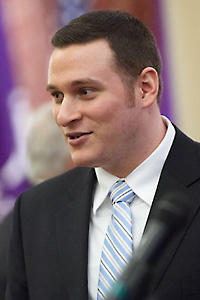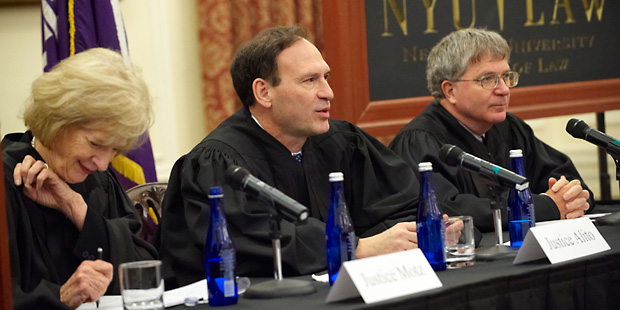A Moot Court of the Highest Order
Justice Samuel Alito presides over the 37th Annual Marden Competition.
Printer Friendly VersionNothing gives a mock supreme Court hearing a frisson of verisimilitude like the presence of an actual Supreme Court justice. On April 8, a standing-room-only crowd witnessed Justice Samuel A. Alito Jr. and U.S. Court of Appeals judges Michael W. McConnell of the Tenth Circuit and Diana Gribbon Motz of the Fourth Circuit presiding over the 37th annual Orison S. Marden Moot Court Competition.
In the fictitious case Veruca Salt v. United States, created by Roxana Labatt ’10 and Kate Corbett Malloy ’10, the petitioner appealed her conviction for attempting to smuggle piñatas filled with oxycodone into the country. She argued that the government had violated her Fifth Amendment rights by introducing as evidence of guilt Salt’s silence prior to her arrest and the reading of her Miranda rights. She also asserted that the Constitution’s ex post facto clause had been violated when the district court judge looked to a newer version of the federal sentencing guidelines that recommended a longer sentence, rather than the guidelines in place at the time of Salt’s offense.
These were thorny questions that, as McConnell pointed out, were “pitched at pressure points within the Supreme Court’s jurisprudence.” Both the petitioner’s counsel, Daniel Weinstein ’09 and Vikram Kumar ’10, and the respondent’s counsel, Matthew Lafargue ’10 and Beth George ’10, faced a barrage of challenging queries from the panel of judges.
Kumar tackled the question of the sentencing guidelines for the defense. Pointing out that a district court can impose a sentence of its choosing, Alito asked, “Why does it make a difference whether the judge imposes an above-guidelines sentence based on new information that is contained in an amendment to the guidelines that is inapplicable to this case, as opposed to similar information that is brought to the judge’s attention in any other form—in a law review article, in a newspaper editorial, on a TV show?” Kumar answered, “Because the guidelines serve as the initial benchmark as per this court’s holding in [Calder v. Bull], and when that benchmark moves in a way that disadvantages a defendant, a significant risk of harsher punishment is created, and the ex post facto clause is violated.”
 On the government’s side, Lafargue made a forceful argument that Salt’s Miranda rights were not triggered prior to her being taken into custody. “I’m not sure that this doesn’t undermine Miranda altogether,” Motz said. “If we should hold your way here, don’t we encourage police officers to just keep defendants in their car over by the side of the road until they do say something incriminating, or, if they keep silent, we use that against them, too?” Lafargue answered, “The petitioner’s concern about the delay of Miranda warnings is unfounded, simply because the right doesn’t trigger at the point at which Miranda is actually read; the right triggers at the point at which Miranda should have been read.”
On the government’s side, Lafargue made a forceful argument that Salt’s Miranda rights were not triggered prior to her being taken into custody. “I’m not sure that this doesn’t undermine Miranda altogether,” Motz said. “If we should hold your way here, don’t we encourage police officers to just keep defendants in their car over by the side of the road until they do say something incriminating, or, if they keep silent, we use that against them, too?” Lafargue answered, “The petitioner’s concern about the delay of Miranda warnings is unfounded, simply because the right doesn’t trigger at the point at which Miranda is actually read; the right triggers at the point at which Miranda should have been read.”
After a brief deliberation, the judges named Lafargue as Best Oralist. But Alito gave high praise to each of the counsel for their preparation and poise: “We were harder on you than we generally are on lawyers who appear before us in regular cases. We wanted to give you a workout, and I think we did. I can’t tell you how many arguments that I delivered as a lawyer when I staggered out of the courtroom after the performance. None of you should feel that way.”
–
All of 2009 Student Spotlight


 Multimedia
Multimedia